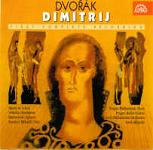Picking up where Boris Godunov leaves off, this opera’s center is the false Dimitri who, certain of his legitimacy, enters Moscow with his Polish army and Marina by his side. The real Dimitri’s mother, Marfa, claims him as the real thing. He marries Marina but falls in love with Boris’ daughter Xenia when he discovers the latter hiding from the brutal, drunken Poles. Marina jealously snitches on Dimitri and has Xenia killed. Marfa is about to swear that Dimitri is the true tsar but he won’t allow her to lie; Shuisky shoots him dead.
Despite the fact that this all takes more than three hours to get accomplished, Dimitrij does not feel bloated. The eponymous hero is a sympathetic, well-rounded man, a dignified ruler capable of great love. Scenes of intimacy between Dimitrij and the three women in his life alternate with those Slavic choral events that can seem overbearing if they’re piled atop one-another; here they’re not. And by varying the texture, Dvorák manages to keep the action moving swiftly. You might argue that the lengthy duets between the supposed tsar and his women go on a bit long (one takes more than 20 minutes), but they don’t drag. Melodic cells are not endlessly repeated à la the bel cantists, nor are any philosophical points being made, à la Wagner. The duets actually go somewhere–the characters awaken to one another, or they begin to see things differently–and each person is well drawn, including our old pal Shuisky, back causing trouble again as he did in “Boris”.
The performance is splendid. Gerd Albrecht misses nothing: he keeps the action flowing and expertly integrates the orchestral interludes and massed moments into the intimate aspects of the story. And his Prague forces play and sing handsomely for him. In the brutal title part, tenor Leo Marian Vodicka shines. The role is very long, loud, and high, and while I wouldn’t exactly describe his way with the role as easy, he does it proud. His enthusiasm is clear in all of his encounters with the women; he’s particularly effective against the potent Marina of Magdalena Hajossyova, who is a harpy with an axe to grind and a tessitura to make Turandot run and hide. Vodicka’s tenderness with Marfa, sung here with warmth by Drahomira Drobkova, is equally impressive. Livia Aghova’s Xenia is occasionally shrill, but more often her anxiety is called for and we sympathize with her. Ivan Kusnjer’s Shuisky is not obviously slimy–a wise move. The rest of the cast, several dark-voiced men included, is excellent.
This opera is a real surprise. It’s thoroughly engaging and, while it may not have a particular aria as stunning as Rusalka’s Hymn to the Moon, it contains some very beautiful music as well as much that is urgently dramatic. The 10-year-old recording is vivid and clear (this is a re-release), and texts and translations as well as intelligent notes are included. Very highly recommended.
































